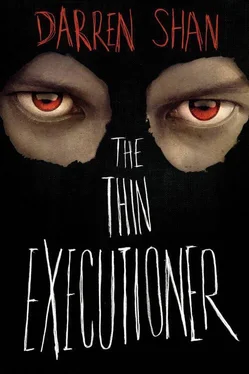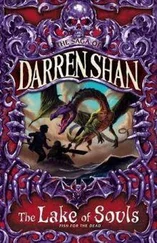Jebel was stunned. He had never seen anything like this. His father was one of the most skilled beheaders ever. No one operated as cleanly and capably as Wadi’s master of the axe. But even judged by the standards of lesser executioners, this man had no style. He’d struck clumsily, painfully, disgracefully. He had wallowed in the victim’s blood and treated him like an animal.
While Jebel gaped, a soldier handed the executioner five silver swagah. There were low boos from some of the people in the crowd. The executioner spat in their direction, then left with the women he had been joking with earlier. The soldiers moved the prisoner’s body and head to the side of the platform, then nudged them over onto a cart. The crowd dispersed, heads low, and within a minute Jebel and Tel Hesani stood alone.
“Was the execution to your satisfaction, my lord?” Tel Hesani asked wryly.
“It was an abomination!” Jebel shouted, then lowered his voice when a woman mopping blood shot him a sharp look. “These people are monsters. That brute shouldn’t be allowed near an axe. I could have done a better job myself.”
“Perhaps,” Tel Hesani murmured. “Although they say it’s no easy thing to cut off another man’s head. Your people have perfected the art, but other executioners are not so skilled. Also, they have less chance to practice here.”
“What are you talking about?” Jebel asked.
“They have less necks to cut.” Tel Hesani took the boy’s elbow and led him away. He spoke softly as they walked, explaining the ways of Abu Nekhele law.
“Very few Um Nekhele are executed. Only serious crimes, such as murder, are punishable by death. Those who steal or maim are sent to jail.”
“What’s a jail?” Jebel asked.
“You know the cells where prisoners are held before execution? Well, in Abu Nekhele they have many of those. But people aren’t just held there prior to being executed. If they’re found guilty of a lesser crime — such as theft — they’re held for months or years, then released.”
Jebel stared at his slave in disbelief. “You mean if an Um Nekhele steals, he stays in a cell for a while, then is returned to the streets to steal again?”
“Yes, although most do not. Jail isn’t a pleasant place. Inmates are confined to tiny cells and fed disgusting food. The punishment has a grave effect on many who suffer it, and most prisoners lead honest lives when they’re released.”
“And if they don’t?” Jebel huffed. “If they come out and thieve again?”
“They’re sent back to jail. If they do it four or five times, they’ll eventually be executed, but such cases are rare.”
“That’s madness,” Jebel said. “Why waste money on scum? If a man steals, he is without honor. It’s better for his family if he’s killed.”
“Perhaps,” said Tel Hesani cautiously. “But some people believe that only their gods have the right to take a person’s life, except in extreme circumstances. And others, such as the Um Kheshabah, believe that all life is sacred and that jail is the worst punishment any human should inflict on another.”
Jebel’s features hardened. “I knew of the cowardice of the Um Kheshabah, but I was unaware of the Um Nekhele’s weakness. Peace has softened and twisted them. First they ban slavery. Now this. Perhaps we should start a new war and beat them back into their senses.”
Tel Hesani regarded Jebel disdainfully. He wanted to ask who had made this boy such an authority on the law. He would have liked to tell Jebel that executioners were regarded with contempt here, that they were usually recruited from drunks found in the foulest taverns.
But if he did that, Jebel might start shouting, demanding justice, decrying the flaws of the Um Nekhele. If the locals found out that Tel Hesani was Jebel’s slave, they’d turn on his arrogant young master, and while the Um Kheshabah had no love for the boy, he didn’t want to see him end up as the victim of a lynch mob.
So Tel Hesani held his tongue and let Jebel rage quietly. When the boy calmed down, the slave led him to a different market, where he picked out the rest of the clothes and goods they’d need for the next leg of their travels — the trek through the hostile, mysterious realm of Abu Siq.
From Hassah they picked their way northeast, keeping close to the banks of the as-Sudat. The land was barren and flat — flaky stone with occasional outcrops of weeds. It was easy to cross but cold at night. Jebel was glad of the extra clothes that Tel Hesani had insisted on buying.
They saw many boats sailing in both directions. Sometimes those on board waved at the pair, but more often they stared suspiciously. It was rare to see people on this side of the river. The stony land was officially part of Abu Nekhele, but most people considered it an extension of Abu Siq, and thus out of bounds.
When Jebel rose after their fourth night, Tel Hesani told him it was time to veer away from the river and search for the start of the siq, which the city-state of Abu Siq had been named after.
“Have you ever seen the siq?” Jebel asked as they cut inland.
“No,” Tel Hesani said. “Few people have. And fewer have lived to tell the tale.”
“What about the Um Siq? Have you met any of them?”
“Only one,” said Tel Hesani. “He had been enslaved and forced to duel for the entertainment of his master. An Um Siq will normally kill himself if removed from his people, but this one had been drugged. He fought to feed his addiction. He was a shadow of the man he must once have been, but he was still the fastest, sharpest warrior I’ve ever seen. He cut apart his opponents as if they were children.”
The ground rose ahead of them, and soon they were climbing hills and hunting for the entrance to the siq. From the top of the slopes, Jebel saw the giant peaks of the al-Attieg in the near distance, rising from the earth like a series of daggers. Many of the peaks were hidden by clouds. The mountains dominated the horizon. There were only two ways through — the gorge or the siq. Both were natural canyons, one created by the as-Sudat, the other by an earthquake, or a river that had long since dried up.
“Will the entrance be guarded?” Jebel asked, panting as they scaled one of the taller hills.
“Probably not,” Tel Hesani said. “Nobody is foolish enough to attack the Um Siq, so from what I have been told they don’t feel the need for guards. I’m more worried about snow.” He looked at the clouds and squinted. “I think we’ll get through before the first fall, but it’s hard to judge. Snow can sweep down within minutes here. If we’re trapped in the siq when a storm hits…”
For hours they crisscrossed the area, hunting for the elusive entrance. They knew that it was hidden behind a large rock, but there were hundreds of rocks in the hills, and each had to be checked. Jebel quickly lost patience, but Tel Hesani made him proceed slowly. If they missed the entrance, it would mean retracing their steps the next day.
They were heading towards a large boulder midway up a hill when the shale at Jebel’s feet exploded as if the earth had spat at him. Jebel leapt back, alarmed. Tel Hesani smiled — he thought some animal had moved beneath the shale — but then the ground at his feet exploded too, and he dropped to his knees. “Get down!” he snapped, drawing a sword and scanning the hills.
Jebel crouched and drew his own weapon. “Are we under attack?”
“I’m not sure. Somebody fired on us, but I don’t know if the shots missed on purpose or by accident.”
Jebel licked his lips and glanced around, looking for cover. Then someone called to them from high above. “Leave this place!”
Читать дальше







